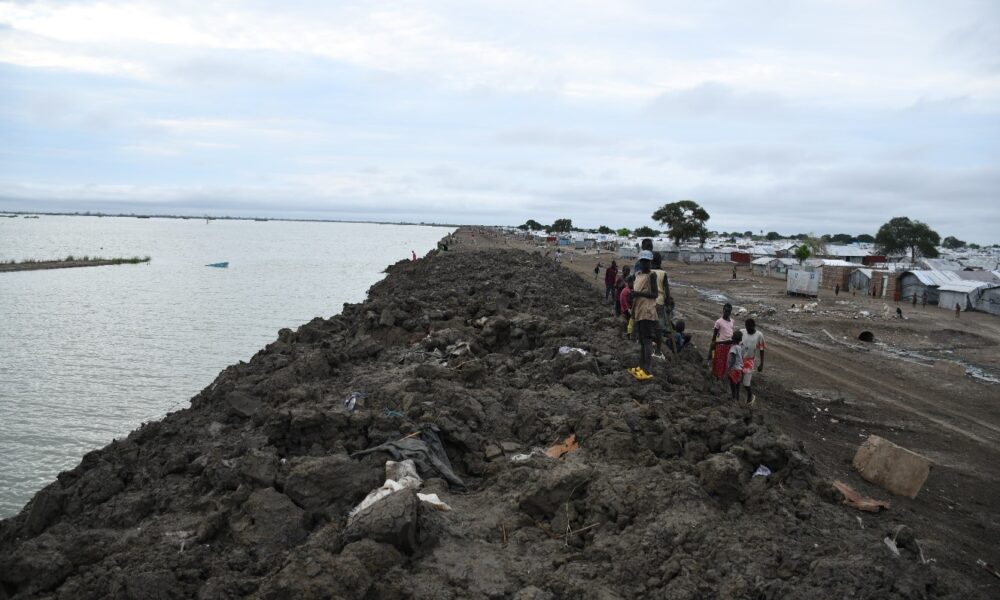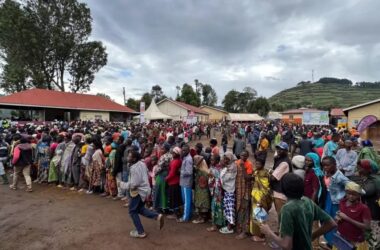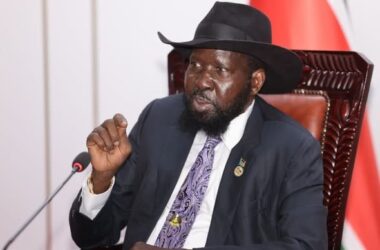By Philip Buda Ladu
United Nations Mission in South Sudan (UNMISS) has become a vital refuge for over 150,000 civilians at the Bentiu Internally Displaced Persons (IDP) Camp.
Originally established as a Protection of Civilians (PoC) site during the 2013-2018 civil war, the camp has faced challenges from both conflict and natural disasters.
As the country began its journey of recovery from civil strife, a new and challenging threat emerged: severe flooding which has affected mostly the northern parts of the country.
To safeguard lives, UNMISS deployed a Pakistani military engineering task force to construct a dike around the camp. The 4-5 meter-high structure is designed to shield the camp from the devastating floods that have impacted the area since 2019.
Maj. Mohi Ud Din, the taskforce commander, explained their round-the-clock efforts to safeguard the camp and surrounding areas.
Despite challenges like material shortages and difficult terrain, they’ve constructed over 120 kilometers of dikes.
“So in order to mitigate that, we have our response resorted to patrolling and several other measures just to make sure that we are aware and alert to safeguard the people from the calamity of the floods” Mohi lamented.
The Pakistani military engineering corps have also played a crucial role in maintaining infrastructure, including the Rubkona airstrip and the main route connecting Unity State. These efforts have ensured access to essential supplies and services for displaced people and the entire state.
While UNMISS has provided vital support, the situation remains precarious with anticipated more flooding. Many IDPs say they face hardships, including food insecurity and limited access to basic necessities.
Residents of Bentiu IDP camp express gratitude for UNMISS’s protection and support.
Tap Mach Dhieu, a 43-year-old resident of Bentiu IDP camp, fled his home village in Panyijiar County, Unity State, to seek refuge at the UNMISS Bentiu PoC in 2014.
He noted that despite being hardworking people, they rely on WFP food rations, and the floods pile another burden on their livelihoods, of which they have to hire canoes to go and collect firewood.
Mr. Dhieu hinted that the lives of the people of Unity State, particularly those in Bentiu, lie on UNMISS.
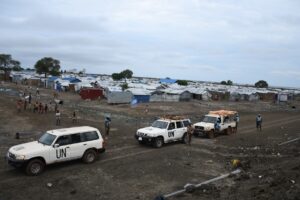
“In Bentiu without UNMISS, people would not be here if they did not make this dike because this is the only safe place. If the outside is flooded, all people come here, and when the water reduces, they go back,” Dhieu emphasized.
Kon Tap Biem, a 33-year-old physically impaired man, also fled war from his home town in Guit County of Unity State and has sought sanctuary at the Bentiu PoC since 2015.
Tap stressed that these floods, which have confined them within the 120 kilometers long dikes surrounding the IDP camp and UNMISS compound in Bentiu, have affected so many people.
Julia Guot, a 24-year-old mother of two children currently sheltering at the Bentiu IDP camp after she fled her home in Bentiu 9 years ago due to fighting, said life at the camp is very hard.
“We don’t have enough food, no place to sleep, and we don’t have good security. We are surviving at the hands of the UN,” she expressed.
David Garang is a Community WASH Group coordinator in the Bentiu IDP camp, working with UNPOL since the PoC was established.
He described the security situation in the camp as calm, with some minor cases of insecurity like the gang groups fighting and theft cases.
Since UNMISS handed over the responsibility of the IDP camp to the government, it now plays an observatory role, doing routine patrols to observe how the government is managing the IDPs in terms of security.
Carla Marisa, one of the police officers with UNPOL in Bentiu IDP camp, told a visiting media team from Juba that they conduct joint patrols every Tuesday, which involve the Mongolain battalion, the Ghanian battalion, and the UNPOL. The patrol covers all five sectors within the IDP camp and lasts for one hour.
“This patrol is very important because we observe the security situation within the IDP camp. We deliver safety and security during the patrol. The patrol is important in order to observe that none of the human rights are violated,” Carla explained.
Apart from the patrol, UNMISS also gives capacity building, supporting the joint police and the community WASH group, and sensitizing the civilians on the risks of children getting drawn into flood waters.
“If UNMISS leaves, the situation will not be okay. The presence of UNMISS is a hundred percent good for the safety of the community at the IDP camp,” Garang emphasized the need for the UN to continue safeguarding their lives.
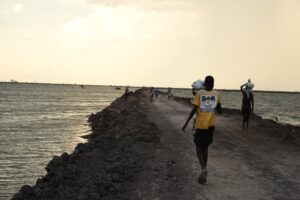
Tor Tungwar, deputy governor of Unity State, said their state has been devastated by the floods since June 2019, and the state government has formed a state and county disaster risk management taskforce and committees to respond to the anticipated worse floods as reported by the national government.
He noted that as far as the response of the government in partnership with its partners, especially UNMISS, IOM, WFP, and UNOCHA, among others, they have responded very well, especially to the previous floods, by constructing about 65 kilometers of dikes in order to protect the state.
“Given the warning from the national government on the forecasted devastating floods, the state government and our partners have been working on upgrading the dikes so that if bad comes to worse in October or now as it has approached in southern Unity State, then we would be able to save lives,” Tungwar assured.
He added that the state has been sending sandbags to local communities at the county level in order to help them make some dikes on their own to protect lives locally where the state and partners cannot be able to send machines like excavators.

